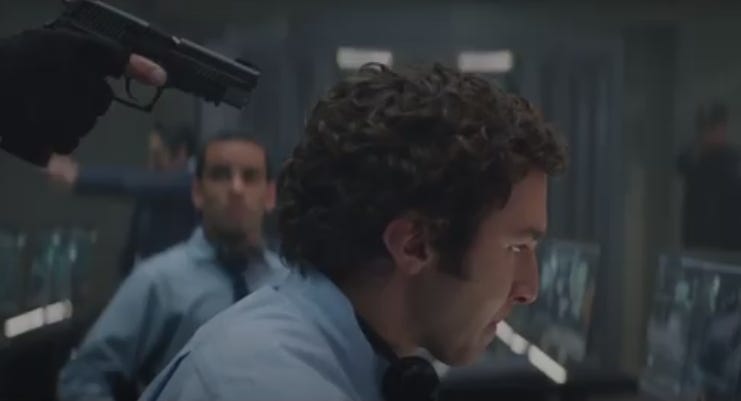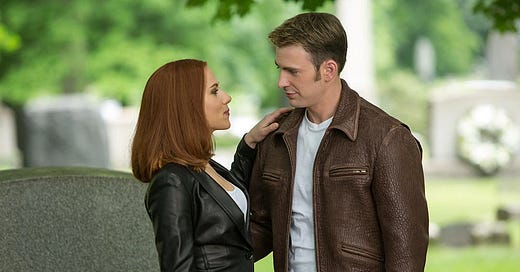The other weekend, I joined a friend to rewatch Captain America II: The Winter Soldier. I was surprised how much I liked it. Even though it had a lot of the common flaws of Marvel movies - such as spending all too much time on superhero fight scenes - it got one thing right that a lot of stories these days don't: friendship.
In Winter Soldier, of course, the denouement is where Captain America appeals to his old friendship with Bucky to bring him back from his brainwashing. Despite what things might look like, despite what Bucky's gone through in the meantime, his appeal works. Their friendship still holds true.
But even more than that appeal to the mystical power of a friendship that's dormant through most of the time onscreen, the movie shows us an onscreen friendship through the film: between Cap and Black Widow. Throughout most of the film, they work together against whatever foes, both to fight and to evade and to investigate - to help each other. They banter, but with visible good nature. We get the sense that they actually enjoy each other's company.
And, I realized, that's something that I haven't seen as much as I'd like in modern stories.
I'm remembering how Peter Jackson treats friendship in his Lord of the Rings films, which I also rewatched recently. Throughout the first film (Fellowship), Jackson goes beyond the books to add far more arguments and distrust between the Fellowship. For example, the hobbits continue doubting Strider's good nature up to Rivendell, and Legolas and Gimli keep bickering throughout the film. Meanwhile, Tolkien has the hobbits trust Strider implicitly after the fight on Weathertop, and Legolas and Gimli become friends by Lothlorien.
What Jackson does is preserve every disagreement about what the right thing to do might be. Some of these disagreements are sensible doubts. But, because of the speed of the film (and how he needs to compress most of the plot from the much-longer books), Jackson doesn't spend much time showing us the characters coming to agreement and working together afterwards. We don't see them acting as friends.
This isn't just Jackson either. Take a near-future sci-fi novel I just finished, Nexus by Namez Raam. Our protagonists are a government agent investigating telepathy nanotechnology implants, and a hacker who's been coerced into working with her. As you might expect, they distrust each other and keep trying to work against each other. Meanwhile, each of them distrusts all the supporting characters around them. It seems - and I can't dispute it - that all our main characters are alone against the world.
I'm not saying Nexus is telling a bad story. It's a good story, and it'd be hard to tell a different one given its setting and characters. This constant bickering doesn't in itself make Peter Jackson's story bad, either. My issue is that we keep getting stories like this - and it feels like we don't get as many stories with good friendships.
Perhaps I'm painting Jackson with too broad a brush. He does (beautifully) show the friendship between Sam and Frodo, especially at the Breaking of the Fellowship and again on the final road to Mount Doom.
But, it doesn't stay that way. Jackson also shows Frodo betraying Sam at Gollum's instigation, pushing him away for the climb to Cirith Ungul. I see why Jackson wanted to do this - both to grab viewers' attention with conflict, and to make the fight with Shelob just afterwards look better on screen. But, the friendship gets the short end of the stick. After this, the rushed pace of the film - however understandable - leaves my overall impression of their friendship weaker than it could be.
It's similar to what Peter Jackson does with Gimli and Legolas's friendship: after almost three films of rivalry and bickering, we get one good line at the Battle of the Black Gate about how they're now friends. That's good, but Jackson robbed us of the chance to see that friendship in action during the story. Again, he's kept the bickering from Tolkien (and added on a bit more of his own), but abandoned the friendship moments, such as where Legolas after the battle doesn't mind that he's lost the Orc-killing contest because he's so happy to see Gimli alive.
This's why I was so happy when Captain America: The Winter Soldier actually showed us such a strong friendship throughout the story. We do get Jackson-like bickering in the Marvel Cinematic Universe. It even makes the story stronger - I'm remembering how Tony Stark's spiky personality and biting retorts shake up his fellow superheroes in the previous MCU movie, The Avengers. But it makes the story stronger because it's not all we have. Not everyone is a Tony Stark.
I'm wondering if, in part, this's because friendship itself has decayed in modern culture. This's a world where journalist Billy Baker can write a whole book on the crisis of friendlessness and his own attempts to make friends (We Need To Hang Out), even though - as I described last year - he comes up with no solutions and no convincingly-depicted deep friendships.
Meanwhile, two hundred years ago (as historian Richard Godbeer tells in his The Overflowing of Friendship), we have myriads of letters between Americans who stayed lifelong deep friends even as they moved far away from each other. Pastors were praising this deep lifelong friendship as a cornerstone of Christianity, and politicians were praising it as a cornerstone of the American republic.
But today, we've lost that. As Godbeer acknowledges, when modern readers hear about that sort of deep friendship, they immediately start wondering if it was a sign of homosexuality. Regular questions are raised about this on /r/AskHistorians (for example, two about Abraham Lincoln.) Many modern readers have the same thought about fictional friendships. Looking back at the comic-book arc that inspired The Winter Soldier film, Vulture magazine described Captain America and Bucky's relationship as "male bonding so powerful that it's regularly read as homoerotic". It seems there was a degree of friendship which we don't have anymore, and we've come close to losing even the concept.
Of course, I'm not saying this's entirely a new thing. I haven't studied exactly when friendship started declining in the modern world or looked into when it stopped being shown so dramatically in stories. But when I've been reading about the decline of friendship, and noticed stories not showing it so strongly - I suspect some relationship.
While thinking about Captain America: The Winter Soldier, I noticed a common arc in all three Captain America films: he's fighting against the establishment, as a seeming rebel. In his first movie, he fights despite orders to stick to entertaining the troops; in his second movie, he fights SHIELD when it's infiltrated by the evil Hydra; in his third movie, he fights the Sokovia Accords. He doesn't represent America the establishment; he represents America the ideal.
But each time, he fights alongside friends and allies. In fact, he doesn't just fight with one or two allies. In Winter Soldier, we see that nameless extras all over SHIELD immediately respond to his call to action. Despite how he's fighting as a seeming lone wolf, he's rich in friends and allies. Showing someone rich in friends doesn't limit the stories you can tell as much as it might seem.

In fact, it probably helps the story.
I saw a joke once (satirizing how Peter Jackson cut scenes and arcs out of Tolkien's Lord of the Rings books to make the films) about how cutting out Sam's character would make Frodo's journey to Mordor even more remarkable. Perhaps it would do that. But even disregarding Sam's own character arc and how he rescues Frodo, it would also lose so much of the story. Sam and Frodo's disagreement about Gollum accentuates Frodo's mercy by making the choice very tangible. And, it's the conversations with Sam which show us so much of Frodo's character arc and his suffering. If we tried to show it in soliloquies, it'd feel much more awkward and probably not dig into it that much. Even after Peter Jackson weakened their friendship by Frodo's betrayal at Cirith Ungol, it's still Sam and Frodo's friendship which carries the story.
I'm glad to see at least one film that shows trusting friendship as a real force and a core of the story in multiple ways.
There's a lot I don't care for about Marvel movies. The worldbuilding is weak, the fight scenes last too long, and multiple conflicts build on each other with too little time to breathe. But when I rewatched this film the other weekend, I was surprised to find it still so good.
Captain America's idealism plays a part in that, I'm sure. That's one reason he's my favorite of Marvel's Avengers. But one big part of how his idealism is shown is his friendships. Friendship is a core to Captain America's character, and to the story.
And in a world where stories like this are so rare, that made the movie feel refreshing to me.






Part of the trouble is that our society has moved toward assuming that every close emotional bond is sexual (or, perhaps, either sexual or parental). If we see Sam and Frodo deeply attached to each other during their long, hard journey into Mordor, we may suspect it of having a sexual subtext that the author surely never imagined and one have rejected; some readers may even wish to interpret it that way because they find it appealing to imagine themselves in such a situation. Likewise with the bond between Hank Rearden and Francisco d'Anconia, or that between Kirk and Spock, which gave us an entire genre of fanfic. This sort of thinking is what gives us the coinage "bromance" and the plots of a huge fraction of fanfic, "slash." And once you're aware of slash it's hard not to see it as an option. That effect may be, as it were, pre-empting the interpretation of strong emotional bonds as (nonsexual) friendship.
As someone who has long thought friendship is undervalued in fiction relative to romances and rivalries, I enjoyed this. Have you seen the recent TV show One Piece? Admittedly it's a Western remake of a manga, but it constantly pushes friendship as its core theme. To the point that I kept watching despite how silly it is.